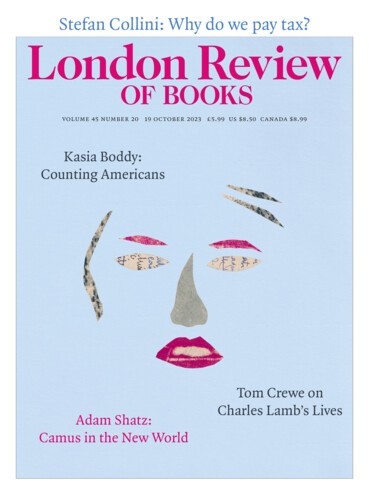Trump insists that the whole Epstein affair is a ‘hoax’ and that his own followers are ‘stupid’ and ‘weaklings’. Their reaction has been intense and swift, since Trump now sounds like the elitists who disparage them – elitists like Hillary Clinton, who called them ‘a basket of deplorables’. Trump scoffs at their complaints, noting that his supporters have nowhere else to go.
Judith Butler
Judith Butler is a Distinguished Professor in the Graduate School at the University of California, Berkeley, where they have taught since 1993. They are the author, most famously, of Gender Trouble: Feminism and the Subversion of Identity (1990) and Bodies that Matter: On the Discursive Limits of ‘Sex’ (1993). Their other books include Frames of War: When Is Life Grievable? (2009), Parting Ways: Jewishness and the Critique of Zionism (2012), The Force of Nonviolence: An Ethico-Political Bind (2020), What World Is This? A Pandemic Phenomenology (2022) and Who’s Afraid of Gender? (2024). They gave an LRB Winter Lecture in 2011 entitled ‘Who owns Kafka?’ and appear on the LRB’s Close Readings podcast series ‘Human Conditions’.
This Is Wrong: Executive Order 14168
Judith Butler, 3 April 2025
In the weeks since his inauguration, Donald Trump has issued a series of executive orders intended to undermine progressive law and, in some cases, the foundations of constitutional democracy itself. The impression, as the orders arrive one after another, nearly a hundred of them so far, is of a self-amplifying state bent on overcoming the rule of law and testing the limits of...
The Compass of Mourning
Judith Butler, 19 October 2023
The matters most in need of public discussion, the ones that most urgently need to be discussed, are those that are difficult to discuss within the frameworks now available to us. Although one wishes to go directly to the matter at hand, one bumps up against the limits of a framework that makes it nearly impossible to say what one has to say. I want to speak about the violence, the present...
Genius or Suicide: Trump’s Death Drive
Judith Butler, 24 October 2019
Donald Trump would have us believe that his behaviour, his lawbreaking, is just fine, perfect even, and that the impeachment hearings are a kind of coup. What he has done he would do again. Indeed, he has already done it again with his open appeal to China to investigate the Bidens and his refusal to comply with the impeachment inquiry. Pundits such as Roger Cohen of the New York Times and...
On Cruelty: The Death Penalty
Judith Butler, 17 July 2014
‘Whence comes this bizarre, bizarre idea,’ Jacques Derrida asks, reading Nietzsche on debt in On the Genealogy of Morals, ‘this ancient, archaic idea, this so very deeply rooted, perhaps indestructible idea, of a possible equivalence between injury and pain? Whence comes this strange hypothesis or presumption of an equivalence between two such incommensurable things? What can a wrong and a suffering have in common?’ By way of an answer, he points out that ‘the origin of the legal subject, and notably of penal law, is commercial law.’
Podcasts & Videos
Judith Butler: Then and Now
David Runciman and Judith Butler
This week two conversations with the feminist theorist and writer Judith Butler: one recorded the week Trump won the presidency in 2016 and one recorded a few days ago, as his presidency (just maybe) approaches...
Who Owns Kafka?
Judith Butler
Judith Butler delivers her lecture on the battle for ownership of Kafka and his manuscripts.
Pieces about Judith Butler in the LRB
Dive In! Hegelian reflections
Bruce Robbins, 2 November 2000
In 1987, three years before Gender Trouble made her the most famous feminist philosopher in the United States, Judith Butler published a book on Hegel’s dialectic of lordship and bondage...
Read anywhere with the London Review of Books app, available now from the App Store for Apple devices, Google Play for Android devices and Amazon for your Kindle Fire.
Sign up to our newsletter
For highlights from the latest issue, our archive and the blog, as well as news, events and exclusive promotions.





